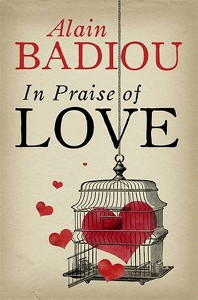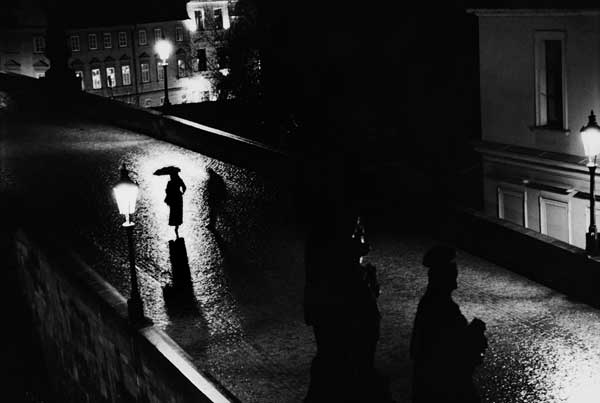“Love is not a contract between two narcissists. It’s more than that. It’s a construction that compels the participants to go beyond narcissism. In order that love lasts one has to reinvent oneself…Everybody says love is about finding the person who is right for me and then everything will be fine. But it’s not like that. It involves work. An old man tells you this!…I have only once in my life given up on a love. It was my first love, and then gradually I became so aware this step had been a mistake I tried to recover that initial love, late, very late – the death of the loved one was approaching – but with a unique intensity and feeling of necessity…There have been dramas and heart-wrenching and doubts, but I have never again abandoned a love. And I feel really assured by the fact that the women I have loved I have loved for always.
…Solving the existential problems of love is life’s great joy. There is a kind of serenity in love which is almost a paradise…’While desire focuses on the other, always in a somewhat fetishist[ic] manner, on particular objects, like breasts, buttocks and cock, love focuses on the very being of the other, on the other as it has erupted, fully armed with its being, into my life that is consequently disrupted and re-fashioned…’ The absolute contingency of the encounter takes on the appearance of destiny. The declaration of love marks the transition from chance to destiny and that’s why it is so perilous and so burdened with a kind of horrifying stage fright. Love’s work consists in conquering that fright…In love, fidelity signifies this extended victory: the randomness of an encounter defeated day after day through the invention of what will endure.
…In Paris now half of couples don’t stay together more than five years. I think it’s sad because I don’t think many of these people know the joy of love. They know sexual pleasure – but we all know what Lacan said about sexual pleasure…To an extent, I agree with him. If you limit yourself to sexual pleasure it’s narcissistic. You don’t connect with the other, you take what pleasure you want from them…I absolutely agree that sex needs to be freed from morality. I’m not going to speak against the freedom to experiment sexually like some old arse – ‘un vieux connard’ – but when you liberate sexuality, you don’t solve the problems of love. That’s why I propose a new philosophy of love, wherein you can’t avoid problems or working to solve them…But avoiding love’s problems is just what we do in our risk-averse, commitment-phobic society. [I] was struck by publicity slogans for French online dating site Méetic such as ‘Get perfect love without suffering’ or ‘Be in love without falling in love’. For me these posters destroy the poetry of existence. They try to suppress the adventure of love. Their idea is you calculate who has the same tastes, the same fantasies, the same holidays, wants the same number of children. Méetic tries to go back to organised marriages – not by parents but by the lovers themselves. Aren’t they meeting a demand? Sure. Everybody wants a contract that guarantees them against risk.
…Love isn’t like that. You can’t buy a lover. Sex, yes, but not a lover…I think that romanticism is a reaction against classicism. Romanticism exalted love against classical arranged marriages – hence l’amour fou, antisocial love. In that sense I’m neither romantic nor classic. My approach is that love is both an encounter and a construction. You have to resolve the problems in love – live together or not, to have a child or not, what one does in the evening…Simone de Beauvoir wrote that you are not born a woman, you become one. I would say you are not a subject or human being, you become one. You become a subject to the extent to which you can respond to events. For me personally, I responded to the events of ‘68, I accepted my romantic destiny, became interested in mathematics – all these chance events made me what I am…You discover truth in your response to the event. Truth is a construction after the event. The example of love is the clearest. It starts with an encounter that’s not calculable but afterwards you realise what it was. The same with science: you discover something unexpected – mountains on the moon, say – and afterwards there is mathematical work to give it sense. That is a process of truth because in that subjective experience there is a certain universal value. It is a truth procedure because it leads from subjective experience and chance to universal value…Real politics is that which gives enthusiasm. Love and politics are the two great figures of social engagement. Politics is enthusiasm with a collective; with love, two people. So love is the minimal form of communism.’”
 Love is one thing philosophers have never really known how to talk about. But Alain Badiou, a French philosopher living in Paris, seems to have reversed that trend. This excerpt is from a conversation he had with Nicolas Truong, a writer for the French newspaper, Le Monde. The conversation was subsequently published in a petite book called In Praise of Love. Yes, Alain Badiou proves that philosophy does have a thing or two of much value to say about the universal but mind-boggling phenomenon we call love. I hope you enjoyed this Brittle Paper offering courtesy of this awesome blog: Love Dog. To be honest, In Praise of Love is kind of a philosophical relationship manual. I know that reading it changed my assumptions about certain things in my relationship. So go ahead, get a copy HERE and start learning things about loving and being a lover.
Love is one thing philosophers have never really known how to talk about. But Alain Badiou, a French philosopher living in Paris, seems to have reversed that trend. This excerpt is from a conversation he had with Nicolas Truong, a writer for the French newspaper, Le Monde. The conversation was subsequently published in a petite book called In Praise of Love. Yes, Alain Badiou proves that philosophy does have a thing or two of much value to say about the universal but mind-boggling phenomenon we call love. I hope you enjoyed this Brittle Paper offering courtesy of this awesome blog: Love Dog. To be honest, In Praise of Love is kind of a philosophical relationship manual. I know that reading it changed my assumptions about certain things in my relationship. So go ahead, get a copy HERE and start learning things about loving and being a lover.









diy energy guides December 18, 2018 01:43
There are two bright spots for anyone considering homemade sustainable energy systems. Many of such free energy generators have been built around the globe by folks who have used them to drastically reduce their energy bills or even completely get rid of them with regards to the scale of implementation. * Dimethylaminoethanol DMAE is related to choline and is also a biochemical precursor to the neurotransmitter acetylcholine.